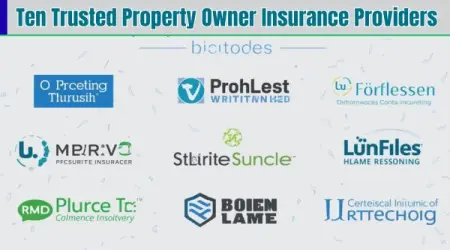Ten Best Homeowners Insurance for New Construction

Every step is a considerable achievement, from building a custom home from scratch to upgrading to a larger abode. That's why we ensure the property is protected with homeowners insurance for new construction. Newly constructed properties may not come with decades of use, but they certainly have their risks to consider.
This guide lists the top ten best homeowner insurance providers for new constructions in 2025 as we consider policies, benefits and overall value provided to new homeowners.
Ten Best Event Promoter Insurance Providers
Why Homeowners Insurance for New Construction Is Crucial
While a newly constructed home might not face the same structural risks as an older property, homeowners' insurance is still essential. Here's why:
* Extended Dwelling Coverage: Covers surges in building costs.
* Replacement Cost Value (RCV): Full restoration or replacement is paid for without depreciation.
* Builder's Risk Add-On: Coverage is optional during construction.
* Water Backup Coverage: Particularly vital for new builds with finished basements.
* Discounts for Modern Safety Features: Smoke detectors, smart locks, and modern electrical systems usually qualify.
Ten Best Commercial Property Insurance
Ten Best Homeowners Insurance Companies for New Construction in 2025
i. State Farm
State Farm’s competitive pricing gives it the edge over other nationally available construction insurers and is accompanied by good customer service. Their policies feature
Includes:
Comprehensive dwelling coverage.
Personal property protection.
Liability coverage.
Endorsed supplemental coverage for water backup and home systems.
Best suited for: DIY homeowners looking for a balanced, reliable insurer.*
ii. Allstate
Allstate policies for new homes are flexible and come with attractive discounts such as:
Includes:
New home discounts.
Bundled auto insurance.
Additional savings with smart home features.
Best suited for: homeowners who are tech-savvy and looking for personalized coverage.
iii. Farmers Insurance
Farmers stands out with their declining deductible program and customizable coverage options and also offers:
Includes:
Guaranteed replacement value.
Identity theft protection.
Sustainable eco-rebuild options for green homes.
Best suited for: homeowners looking to go green or add extra protective layers.
iv. USAA
Specifically for service members and their families, USAA provides exemplary service and amazing coverage.
Includes:
Replace cost coverage as standard
Discounts for military personnel
Exceptional customer service ratings
Best suited for: With USAA, the best customers are military families building a new home.
v. Liberty Mutual
Liberty Mutual provides easy-to-use online tools and flexible coverage.
Includes:
Home insurance calculator
Inflation protection
Deductible savings program
Best suited for: With Liberty Mutual, the best customers are digital-first homeowners and those who prefer to manage their policy online.
vi. Nationwide
Nationwide offers excellent add-ons, including Brand New Belongings coverage, which replaces stolen or damaged items with new items.
Includes:
Optional flood and earthquake endorsements
Coverage for ordinances or law compliance
Guaranteed rebuilding cost coverage
Best suited for: With Nationwide, the best customers are comprehensive protection seekers.
vii. Chubb
Chubb caters to high-value properties, custom-built homes with white-glove service, and higher coverage limits.
Includes:
High limit liability insurance
Extended replacement coverage
Risk consulting services
Worldwide liability protecting
With Chubb, the best customers are luxury new construction homeowners.
viii. Travelers
Well known for financial strength and customer reliability, Travelers offers smart discounts for newly constructed homes.
Includes:
Green home coverage
New home/security system discounts
Flexible deductibles
Best suited for: With Travellers, the best customers are environmentally conscious buyers.
ix. American Families Insurance
American Family offers modern tools and personalized plans, great for first-time homebuyers.
Includes:
Customizable coverage packages
Smart home discount programs
Useful mobile app for claims and claim tracking
Best suited for: Young families building their first home.
x. Hippo Insurance
Hippo is a tech-driven insurer using AI to provide estimates and coverage for contemporary homes quickly.
Includes:
Smart home monitoring integration
High dwelling and electronics limits
Quick online applications and claims
Best suited for: Homeowners seeking swift, digital-first, comprehensive solutions.
Conclusion
Selecting the ideal homeowners' insurance policy for your newly constructed home is equally as crucial as selecting a builder. Tailored policies with custom-made add-ons, i.e., discounts for specific features a home might have configured, shift the burden of spending towards the homeowner and are best served by the ten providers we reviewed.
It does not matter if you prefer customer support, easy-to-use tech features, or extensive coverage for rebuilding; your ideal policy is waiting. Please review different offers for quotes and check your requirements to protect your dream home immediately.
Top Ten Workers Compensation Insurance Providers
Tips for Selecting the Best Insurance Provider
Compare several quotes at once.
Inquire about gaps in coverage for pre- and post-construction.
Check the financial rating through AM Best.
Determine eligibility for smart tech and unbundling discounts.
Know the deductible limits and options.
Frequently Asked Questions
Is homeowners' insurance needed before the construction is done?
Yes. Most lenders need proof of insurance before the closing, and builders may need builder’s risk policies during construction.
What distinguishes builder's risk from homeowners' insurance?
Builder's risk protects the house under construction, covering the materials, labor, and vandalized work; homeowners' insurance goes into effect after the house is completed and occupied.
Can I change the insurance policy after constructing my house?
Yes. After the construction of the house, you are at liberty to look for other policies and providers for better coverage or rates.
Do newly constructed homes qualify for lower premiums?
Most likely, yes. New constructions are often eligible for discounts thanks to the brand-new safety features incorporated into them and the generally low risk associated with new builds.
What if my new home is in a flood or wildfire zone?
In these circumstances, you will need additional flood—or wildfire-specific—coverages based on your area. Always make sure to examine FEMA’s flood maps and state-specific wildfire zone maps.










